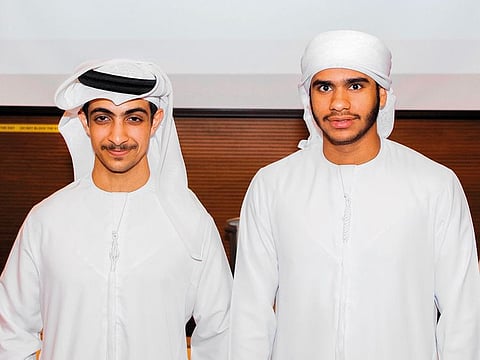Dh1m aid to develop device that alerts drowsy drivers
Two Emirati students earn the grant from VPS Healthcare

Abu Dhabi: A pair of young Emirati students who developed a device that can alert drivers when they start getting drowsy or distracted while on the road have been granted Dh1 million in funding by VPS Healthcare with the goal of having their medical start-up project become commercialised in the UAE.
The students were part of the Future Medical Stars programme, a joint initiative involving VPS Healthcare and Al Bayt Mitwahid Association, which is aimed at supporting young talented Emirati students and their start-up ideas for the country’s health care industry.
“Our goal was to ensure that these young innovators and entrepreneurs had the right kind of support and mentorship to make their ideas a reality. We applaud their passion and are proud now to back the acceleration of their products to commercialisation,” said Dr. Shamsheer Vayalil, chairman and managing director of VPS Healthcare.
“Creating unique intellectual property is critical for the UAE’s goal of becoming a knowledge-based economy and the Future Medical Stars is the right platform to help deliver on that promise, by promoting not only innovation, but also translational research that leads to development of products,” he added, highlighting the importance of supporting local based talent.
Ahmad Al Mansouri, the team lead on the ‘We Heart’ product, said the technology would help to ensure safer driving and less accidents in the UAE.
“Our We Heart product operates with a camera that faces the individual when undertaking a particular intense task, such as driving or any other manual task that requires ultimate concentration.
“Through the machine learning innovation of We Heart algorithm, we aim to reduce the rates of automotive incidents and other sleep-related accidents — therefore having an impact on the medical industry by being a preventive opposed to a diagnostic or cure,” he added.
“We are currently working on the software and hardware parts within this project. The software will be the application on your smartphone which is connected with the hardware side of the project, which is the camera,” he explained.
Al Mansouri said the camera would be able to monitor a driver’s eye and face, with an alarm being sounded if the driver’s eyes start closing.
“As soon as the camera detects the person’s eyes getting drowsy or the driver getting distracted an alarm noise will be made to alert the driver.
“Our goal now with the funding is to seeing this product commercialised in the next 12-18 months,” he added.
Al Mansouri said that truck drivers would be one of the product’s main targets.
“This device is going to be very beneficial for truck drivers who drive for long hours and long shifts, they’re a very big interest to us as they frequently come across drowsy driving.
“There will be an obvious safety benefit but also an economic one as well as this can ensure that the produce or products that are being delivered all over the UAE and the Middle East are reaching safe and sound, and this is good for the companies,” he added.
The We Heart product was one of two projects to receive funding. The second project — Polka — is an artificial intelligence-powered learning platform that can imitate conversations on medical topics.
“At its core, Polka is an algorithm that is powered by artificial intelligence. The intelligence allows users to get information about symptoms associated with ailments and the need of seeking medical care based on the education the algorithm identifies and provides,” said Sultan Al Suwaidi, the student lead on the project.
“My team and I both honoured and excited … for producing a platform that allows Emiratis to generate intellectual property that can benefit the entire world,” he added.
How ‘we heart’ works
■ The device has a digital camera that is linked to a smartphone application ■ The digital camera is focused on vehicle drivers and monitors the driver’s eyes and face. An algorithm using artificial intelligence detects changes on the face of the driver and can tell if he closes his eyes or if he is feeling drowsy ■ The application linked in the smartphone sounds an alarm to alert the driver
Sign up for the Daily Briefing
Get the latest news and updates straight to your inbox


